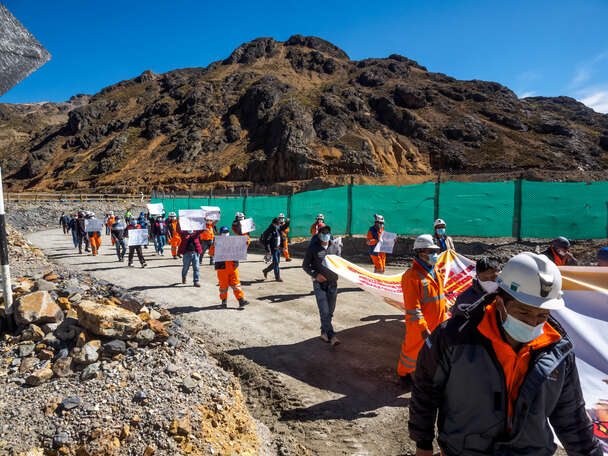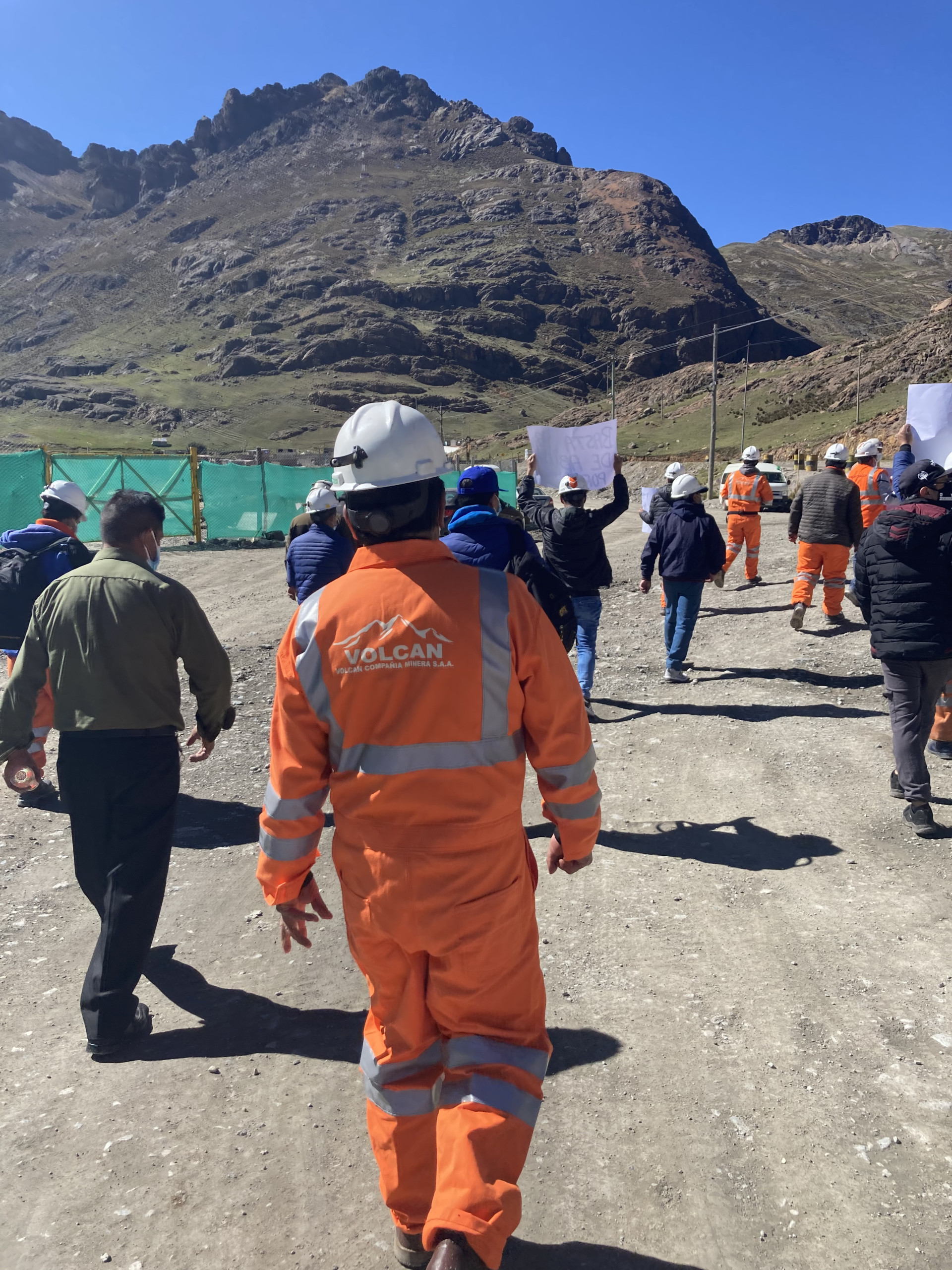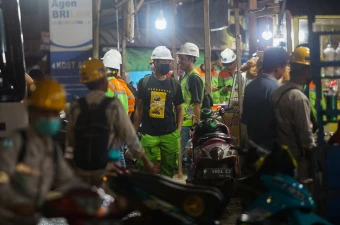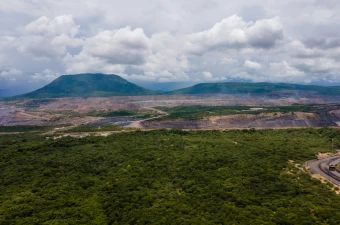What is happening in the metal mines in the Andes, vital to the worldwide energy transition?
Update
On February 24, the Department of Labour in Junín (Peru) issued a statement that forces mining company Volcan to enter into dialogue with its workers, who have been on strike for 60 days. A big step forward in recognizing this trade union that represents direct and outsourced workers at this mine mainly owned by the Swiss multinational Glencore.
During the strike that began just before Christmas, the miners received neither wages nor positive response to their demand for dialogue from the company.
The strike at the Andaychagua mine in Peru started because a large group of workers rejected the labour practices at the Volcan mine, owned by the Swiss multinational Glencore. Until today the company refused the workers' call for a real dialogue to come to agreements.
Backgrounds

Learn more on the factors that led to the current situation:
Volcan is the main mining company operating in the Junín region in the high Andes of Peru, where several of the country’s most important mines are located, producing polymetals vital for the worlds energy transition.
Volcan is owned by one of the world's largest multinationals, Glencore, which owns 55.03% of the company's shares. Glencore is dedicated to the production, purchase and sale of raw materials and food.
Although the strike of December 2021 appears to be just another strike in the industry, there are several reasons that led Peruvian miners to take up the fight to defend their rights. This is an account of what has happened so far.
An historical tour
From the 1990s onwards, Peru began to consolidate itself as one of the main mining countries. Profits for the industry were high, both because of the large amount of exploitable natural resources and because of the availability of a much cheaper labour force than in other corners of the planet.
Natural resources and cheap labour force
During this decade, mining also became the fundamental pillar of the entire Peruvian economy. It opened the doors to the international market and positioning of the country in a remarkable place within the industry. Since then, Peru is considered one of the largest producers of metals such as copper, tin, silver and zinc, which are mainly exported to Europe and the United States.
The metals extracted from Peruvian mines are fundamental in the mining production chain of the planet, because they support the entire digital revolution and the upcoming energy transition: cell phones, televisions, tabletsand everything related to connectivity is based on the mining production of metals such as silver, zinc, copper and cobalt.
However, this economic opening has led to precarious working conditions for Peruvian workers from many perspectives.
Video: fictitious freedom of association
The fundamental milestones of the mining struggle
Since 2015, with the approval of the outsourcing law that guarantees a way to reduce costs and make the Peruvian industry even more competitive internationally, more than 70% of the mines in the metallurgical sector in Peru employ workers without direct contract with the mining companies. This means that of the total number of employees in the mines, the company is only responsible for complying with the labour guarantees of those who work directly in its mines. This means a reduction of labour costs.
In the case of Glencore, the company has insured on its website that it follows and complies with the ILO’s International conventions of Human Rights and Fundamental Declaration of Labour Principles and Rights at Work, and indicates it has established a protocol to guarantee the labor rights of outsourced workers of its providers. Glencore makes the subcontracting companies responsible for meeting correct working conditions and labour rights. This way Glencore washes its hands of the matter.
Besides outsourcing, the working conditions that miners have to deal with on a daily basis are also reason enough to unionise. They are constantly exposed to dust and gases released in the mines and they work without the required protection, which makes them vulnerable to silicosis, an irreversible and respiratory disease. Furthermore, the minimum wages are not enough to meet decent living conditions of the communities.
One of the tools that Volcan, one of Glencore's most important mines in Peru, has used against unionised workers is the non-renewal of union leaders' contracts, which violates their labour rights to be represented on union boards.
Factsheet: hidden risks in mining

Lack of measures during COVID-19 pandemic
In 2020, during the pandemic, Volcan Compañía Minera failed to provide the necessary biosecurity conditions. Workers were exposed to contamination and the spread of the virus.
In the same year, work was suspended for miners without pay, which had a huge social and economic impact on the communities in the Andes region.
ABP pension fund withdraws investments
In 2021, anti-union practices hit rock bottom. However, Volcan's union has not been the only one to raise its voice regarding the company's labour rights violations.
Some major investors, such as the Dutch pension fund ABP, have also been aware of labour and human rights violations and sustainability. As a result of this and the lack of confidence that the company will change its behaviour , ABP announced in an official statement on October 15, 2021 that it would withdraw from Glencore's mining shares. The pension fund has set a precedent for other investors to follow if the situation does not improve.
Attacks on union leaders
The anti-union practices in 2021 were directed personally against leaders such as Alex Tinoco, General Secretary of the Metallurgical Miners’ Union of Andaychagua Volcan Compañía Minera, and of specialised companies, contractors and intermediaries. He has been subjected to persecution and dismissals by the company, which was one of the main reasons for the union to organise strikes and demonstrations that began in December 2021.
Under Tinoco as General Secretary, the union made it possible for outsourced workers to organise and demand respect for their rights. This is one of the main reasons why Volcan has intensified its attack on the union and even exerted significant pressure on the federation of trade unions to expel Alex Tinoco from collective bargaining, under the argument of "union illegality".
In early 2022 the strike continued not only near the Volcan Andaychagua mine but also in other parts of the Junín region as far as the Peruvian capital Lima. The Ministry of Labour issued a statement affirming the legitimacy of the Andaychagua metal workers’ union Volcan Compañía Minera and the specialised, contractual and intermediary companies, as well as the company's duty to sit down in good faith to negotiate. However, that same day, Volcan Compañía Minera assured in an official communication that it will not participate in the dialogue and that it chooses the legal route to meet the demands of the unions.
Correspondance | Letters
Study on violations of labour rights and outsourcing at mining sites
In 2020, a study conducted by Jaris Mújica, Peruvian researcher and anthropologist, showed results that mark the importance of union presence in the mines owned by Glencore in Peru. The analysis, which contains the voices of miners, both from Andaychagua (Yauli, Junín) and Antapaccay (Espinar, Cusco) mining sites. It emphasizes the labour conditions of outsourced workers, the absence of long contracts, the non-payment of overtime, as well as the precarious health and safety conditions to which they are exposed.
> Learn more: Study on violations of labour and union rights of outsourced workers (DOWNLOAD PDF)
Everyone's responsibility
By not accepting and respecting the outsourced mine workers' labour rights to organise their own trade unions, Volcan Compañía Minera is seriously violating the fundamental right of freedom of association. This right is defined in Convention C087 of the International Labour Organisation (ILO).
It may seem to be a case that concerns only the company and the trade union. However, in the worldwide value chain, coal mining plays a crucial economic role. Which is why it should be everyone's responsibility - of investors, shareholders, and marketeers - to keep their due diligence obligations, in order to make sure fundamental rights are respected.
Today, the strike is still going on, since before last Chrismas, since which the miners have not received any economic compensation. The meetings that have taken place between Volcan, the regional labour authority and the union have not resulted in an effective agreement on collective bargaining.
In addition, in January 2022, Volcan has charged two workers with serious misconduct, to punish them for exercising their legitimate right to strike. One of them has even been unjustifiably dismissed. Nevertheless, the miners continue their tireless struggle to defend their rights.
Timeline
Made with Visme Infographic Maker
Publication date 08 02 2022


